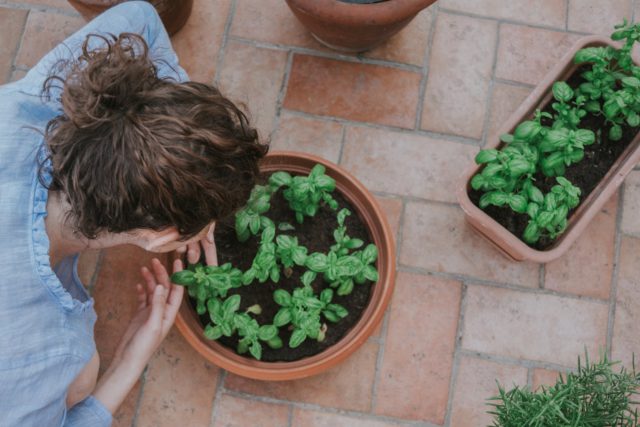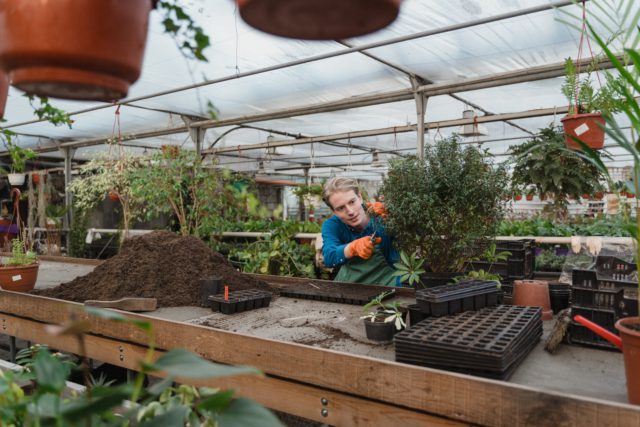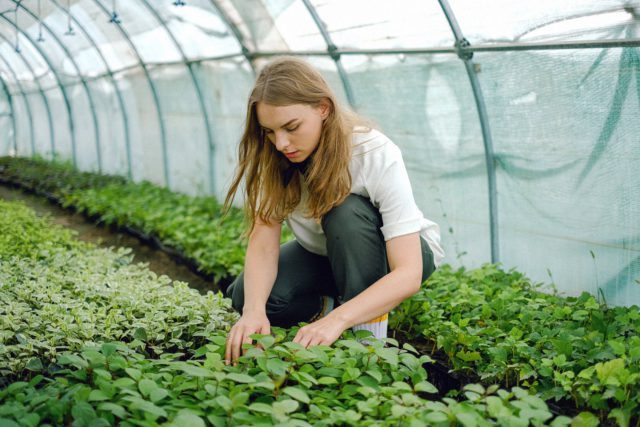Today, when we suffer from disrupted supply chains and lockdown measures, gardening or agriculture is a great way to grow your own tasty and healthy crops and enjoy the time outside. In fact, gardening is good for the soul, it has a therapeutic effect on many levels. Just being around nature can make you feel more at peace and improve your mood. Besides, digging, planting, and watering will help emotionally relax and relieve the stress of everyday life.
Related: Seniors Health Get a Boost From Green Spaces
When you start gardening, you should stay in touch with the environment and try to do as little harm as possible, no matter the size of your garden – from containers to acres.

To find out how to garden naturally and help you create a beautiful, eco-friendly, zero-waste garden, we’ve teamed up with farmers, gardeners, and environmental experts. The tips mentioned in this post are super easy to do, they just take a little bit of commitment. Keep reading to get inspired!
Why Gardening Is Good For The Environment?
For those who want to incorporate eco-friendly living, gardening naturally is the very first step! By growing your own crops and plants, you’ll know and control what has been added to your food. You might want to use only organic liquid fertilizer and avoid hazardous herbicides and pesticides. Only you will decide what you need to use on your own plants! This way, you’ll improve the local ecosystem and ensure that you and your family consume healthy foods.
Gardening will save the world! And these are not just empty words! First, when gardening naturally, you reduce the number of resources and emissions that go into growing conventional food. Did you know that on average in the U.S. food travels about 1,500 miles from farm to plate? Second, you decrease the number of materials needed for food packaging, which can account for plenty of individual waste. That’s how gardening helps the environment!
10 Tips For Zero-Waste Garden
TIP 1: Get Quality Gardening Accessories
When you start gardening or need new gardening tools, invest in high-quality items that will last the distance. Buying cheap, poor-quality ones is a false economy. All in all, you don’t want to find yourself with broken garden accessories to dispose of in a year’s time, that’s a waste of money and time. So, buy for life.

TIP 2: Conserve Water
Although we have plenty of water on the Earth, there is only 0.3% of usable water. We must save it for a sustainable future and next generations. That’s why water usage is the biggest environmental issue we face when gardening pants. Here are the top tips on how to reduce water usage in your yard:
- Collect rainwater – get a rain barrel for collecting rainwater and hydrating the plants with it all summer long. You can buy or DIY the barrel for your backyard.
- Collect shower water – although collecting shower water won’t make a huge dent in the watering of your whole garden, especially if it’s big, you can still use this water for indoor house plants.
- Use mulch in the garden – mulch helps retain moisture in the soil so you won’t need to water plants as frequently. It’s also very helpful in reducing weeds naturally.
TIP 3: Avoid Using Chemicals
Chemicals are not good for gardening and landscaping. The result might be faster at first, but in the long run, chemicals ruin plants. They destroy the intricate web of life in the soil, which leads to the damage of the soil structure. As a result, the soil gets compact, and roots find it difficult to breathe. There are plenty of natural methods and organic solutions to control pests and weeds in your garden.
TIP 4: Make Compost
Making your own compost is the most interesting and fun process in gardening. All your need is just to keep biodegradable waste in one particular place in the yard, and in several days compost will be ready. Homemade compost is a perfect method of recycling green waste and the best solution for gardening crops. Making it will cost you nothing, but it’ll give you a lot.
So, dig up some space in your yard or get a huge bucket with a lid, place all your biodegradable waste there. You can also add excessive grass from your lawn.
TIP 5: Improve The Soil
You often need to add some nutrition to the soil for better plant growth. There are lots of packaged plastic nutrients, but this option is not for us – those who want to go green. Here are 2 waste-free solutions you can try:
- Make your own compost – as we touched on above, creating compost is a zero-waste habit.
- Collect used coffee grounds – coffee grounds have plenty of essential minerals for the garden soil, especially nitrogen. Ask a local coffee shop to give you their used grounds.
TIP 6: Pick Up The Soil In Bulk
Do not buy garden soil in plastic bags, instead, check if there is a place in your city where you can collect compost, mulch, soil, and topsoil in bulk for your garden. You can even find companies that deliver soil right to your home. Moreover, it’s a great option if you have a big garden.
TIP 7: Repurpose And Upcycle
Using recycled materials and stuff for a garden is a great way to go green. In addition, recycled things give you the opportunity to exercise your creativity, bringing time-worn charm and character to the yard. Due to such things, you can also amplify your home design and identity in the future. How can you recycle or upcycle some of your home items? Here are 2 ideas:
- Create upcycled plant markers – utilize your old bamboo toothbrush to make an upcycled plant marker. Just write the plant name on the toothbrush handle, break off the head, and stick it in the garden bed.
- Donate plastic plant pots – small local plant nurseries may take your used plastic pots for reuse in their shops.

TIP 8: Opt For Eco Materials
By choosing eco-friendly materials, you significantly reduce your carbon footprint. What materials to look for?
- Oak
- Cob (clay and straw)
- Rammed earth
- Woven willow
- Log walls
- Straw barrels
- Chestnut paling timber
These materials are full of character! However, they may be less durable than, for example, items made of cement, so you should consider this when choosing something for your garden. If you aren’t sure, do consult suppliers or craftsmen.
TIP 9: Create A Green Roof
Green eco-roofs are becoming popular since they provide good insulation, increase biodiversity, control water run-off, enhance air quality, plus, they are super attractive. Today’s market offers various construction techniques, or you can even retrofit your own garage or shed if they can take the weight.
TIP 10: Do Not Use Railroad Ties
One of the most popular gardening know-how is using old railroad ties for construction raised beds since they are cheap. Never use railroad ties for anything in your yard! They contain a toxic chemical called creosote which penetrates into the ground.
So, if you want to design raised beds, opt for safe materials, e.g., newly cut boards or reclaimed woods/boards.
We hope our tips will help you build a zero-waste, eco-garden.
If you know good tips and tricks on gardening, share them with us in the comment section below! We appreciate your experience!
About the writer
Archie was a builder for more than 40 years. Mainly after his retirement he enthusiastic electrical works in the garden and writes for a blog Homemakerguide to keep himself occupied. His many years of experience can get you the right tool reviews whether it is a drill, welding machine or so. An impressive fact to note about him is that almost everything in his house is a representation of his skills made by his hands.
